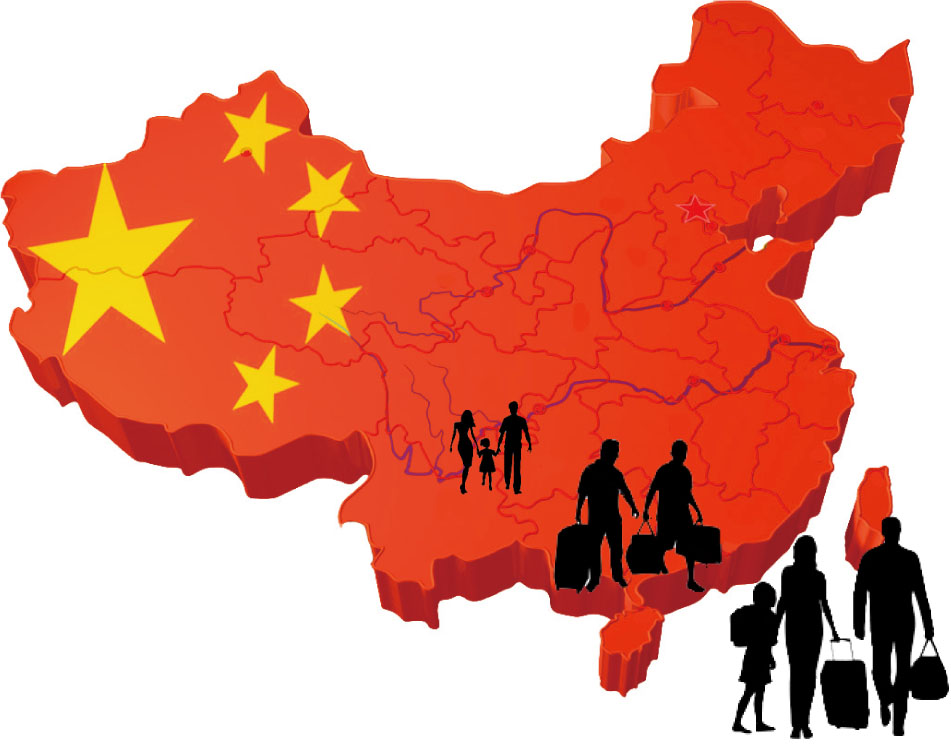Hong Kong identity no longer an ideal for migrants from the mainland
Reporters: Carmen Shih and Gienne Lee
Lei Ching-yee and her husband Wong Chung-ping still remember what people called them when they first came to Hong Kong in the 1980s. “Ah Chan” was a generic term for mainlanders, derived from a character from the mainland in a popular TVB soap opera of the time.
Lei and Wong may have been living among other Cantonese speaking people of Han Chinese descent, but their neighbours had constructed another identity for new immigrants such as themselves. They were seen as industrious workers, but also as bumpkins who did not fit in fast-paced Hong Kong.
Lei arrived in Hong Kong in 1980, Wong a year earlier. Both had come to Hong Kong illegally from Dongguan in Guangdong province. At the time, the colonial government had a policy which allowed immigrants from the mainland to settle in Hong Kong if they managed to reach the urban areas of Hong Kong and had a place to stay.
They were both in their twenties and had come in search of a better life. Lei says there was not enough food to eat at home in Guangdong, and they survived on sweet potato peel. But relatives from Hong Kong often brought her a lot of gifts and beautiful clothes. She decided the city must be a better place to make a living and expected she would have a shining future if she made it there.
The reality was different. After her arrival, she realised Hongkongers were not as rich as she had imagined. The family she stayed with in Ping Shek Estate were crowded into one small room. Her relatives could not afford air-conditioning and made do with a fan. Children in the family slept on the floor as there were not enough beds.
Still, Wong and Lei got jobs in the factories and settled in the city. Some locals regarded the new arrivals as competitors in the job market or looked down on them. But Lei says people were friendly on the whole. “They did not bully us because we were mainlanders,” she says.
Now, after more than 30 years, Lei and Wong regard themselves as Hong Kong Chinese – their family is rooted here. Wong says he treasures the freedoms of Hong Kong. “In Hong Kong, if you work harder, you must have your reward,” he says.
Unlike Lei and Wong, who sneaked into Hong Kong, Bruce Chan Kwok-tung, a specialist in psychiatry, left Shanghai with his family in 1984 and settled in Hong Kong under the One Way Permit scheme. This was a controlled immigration scheme with a daily quota.
Chan says he had a hard time finding his identity at first. He was eager to become a Hongkonger and remembers saving his pocket money to buy a Walkman cassette player and music tapes. “By doing the same things as other Hongkongers, I felt like I was already fitting in,” says Chan. He is glad that he made a lot of good friends in Hong Kong who welcomed him into their social circles.
Chan, then a 13-year-old, made a big effort to integrate into his new surroundings. Immersing himself in popular culture, through television series and Cantopop, helped him to adapt. “I learnt almost all my Cantonese from TV series and Cantonese songs at that time.”
Even as he was striving to be a Hongkonger, Chan never forgot the fact that he was a Chinese. He is proud of being Chinese simply because China is where he is from. His clinic is furnished with Chinese furniture and decorated with Chinese calligraphy pieces.
Chan says his background as a mainland immigrant makes him more tolerant of the behaviour of mainlanders. He acknowledges there are differences between the behaviour of Hongkongers and mainlanders but he respects these cultural differences.
Chan describes himself as an amphibian, equally comfortable in Hong Kong and the mainland. This double identity gives greater flexibility in his dealings with his environment. “When I travel to Japan, I will identify myself as a Hongkonger as Hong Kong has a better image to Japanese and I can have better service,” he says. However, Chan believes that, on the whole, Hong Kong can no longer be seen as superior to the mainland .
As earlier migrants Lei and Wong point out, people in the mainland are no longer so keen to acquire Hong Kong identity. This is because of China’s growing economy and international influence. In fact, Lei says she would not consider moving to Hong Kong if she was still living in the mainland now.
This view is echoed by Betty Yung Au Wing-kum, who is responsible for the administration of the New Immigrants Service Centre. Yung says that while migrants might have thought that Hong Kong’s streets were paved with gold in the past, they soon find this is not the case. Encountering language problems, cultural differences and differences in the way of life between Hong Kong and their hometowns, many female migrants find life here stressful.
Emma, Cherry, Kuen and Kei gather at the New Immigrants Service Association every week to take courses in Cantonese, computer skills and to chat. They are all homemakers and say they prefer life in the mainland to life in Hong Kong. The women say they only came to Hong Kong for the sake of their families and have no desire to acquire Hong Kong identity.
Emma came from Henan in 2002 because her husband wanted their child to be educated here. Emma says she enjoyed her life in her hometown. She had a lot of support from her family and she lived in a large duplex apartment. “If I had a choice, I would not have come to Hong Kong,” she says. Hong Kong may be the place she is raising her family, but she does not have a sense of belonging. “Even though I’ve got a Hong Kong Identity Card, I am still a northerner.”
Her friend Cherry also finds it hard to feel at home in Hong Kong. Cherry comes from Guangdong and is still waiting to get her Hong Kong Identity Card. Before coming here, she thought Hong Kong was clean and the people were more polite and educated. She has since discovered people also use foul language here.
She used to work for a design company in Shenzhen where the pace of work was leisurely and staff went home at five o’clock. In Guangdong, Cherry slept early and woke early. Now, while she still wakes early but sleeps late, she still finds the life of Hong Kong people much too busy and hard to follow.
Over the years, people have migrated to Hong Kong from the mainland for different reasons. As adults, some came in search of a better life, some to raise their families. Others came as children accompanying their parents and while they did not choose to come, they have become Hongkongers with distinct views about their identity.
Cassie Wan Yim-ting, a first-year student at Hong Kong Polytechnic University, came to Hong Kong with her parents in 1998. Wan says she is glad to be a Hongkonger when it comes to enjoying human rights and freedoms. During the Lunar New Year holiday, she visited her relatives in the mainland and found Facebook and Yahoo were blocked. She questioned the necessity of such tight control over the internet and felt herself lucky to enjoy more freedom in Hong Kong.
However, she does not stress her Hong Kong identity and is comfortable saying she is a Chinese. While being Chinese does not make you a Hongkonger, “it makes no sense to say you are a Hongkonger but not a Chinese,” says Wan. She believes the mainland is not as well developed as Hong Kong, but says this does not mean Hong Kong people are superior to people in the mainland.
For Wan, the mainland holds great opportunities for career development. While most of her classmates are unwilling to start their careers there, she wants to take advantage of her double identity to make a mark there.
The mainland also offers her other perspectives. Although she has lived in Hong Kong since she was 10, Wan still cannot figure out why people have to walk so fast. She recalls looking for a shop with a friend and walking so fast that they walked right past it without noticing. Hong Kong people are hardworking and law-abiding, she says, but sometimes they tend to overlook what is around them. She thinks the pace of life on the mainland is more leisurely.
Rayo Kwok King-yan, another first-year student at Hong Kong Polytechnic, came to Hong Kong in 1999. He is also comfortable with being Chinese and disapproves of those who try to change their identity. “You can bleach your skin white, dye your hair blonde and wear coloured contact lenses,” he says, “but deep inside your bones, you are still Chinese.”
Kwok, who is studying fashion and textiles, envisages he will have to move between Hong Kong and the mainland in his future work. But he says Hong Kong is a place he wants to live in. “I appreciate the fighting spirit here,” he says.
Kwok also believes that one of the strengths of Hong Kong people is their language ability. He takes his ability to speak fluent English as a criterion to define himself as a Hongkonger. That is why he did grammar exercises every day when he was in primary school.
According to Professor Eric Ma Kit-wai, of the School of Journalism and Communication of The Chinese University of Hong Kong, the flexible identity of these new immigrants is called double identification.
Ma says there have been changes to how mainland immigrants regard themselves, and the changes are closely related to development in China. In the 1970s, Hong Kong was better off and mainland immigrants, who were mainly working class, felt inferior. They would try to disguise their accents and work hard to improve their Cantonese. They were eager to learn to become Hongkongers.
But as China has become more culturally diverse and economically stronger, Hongkongers are less repelled by mainlanders’ living style. The distinction between mainland immigrants and Hongkongers is no longer obvious. “We cannot say Hongkongers and mainlanders are different in nature. They are all Chinese,” says Ma.











































